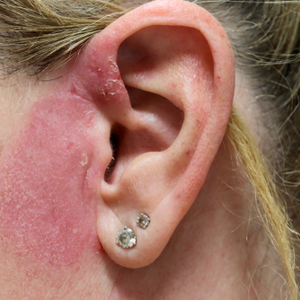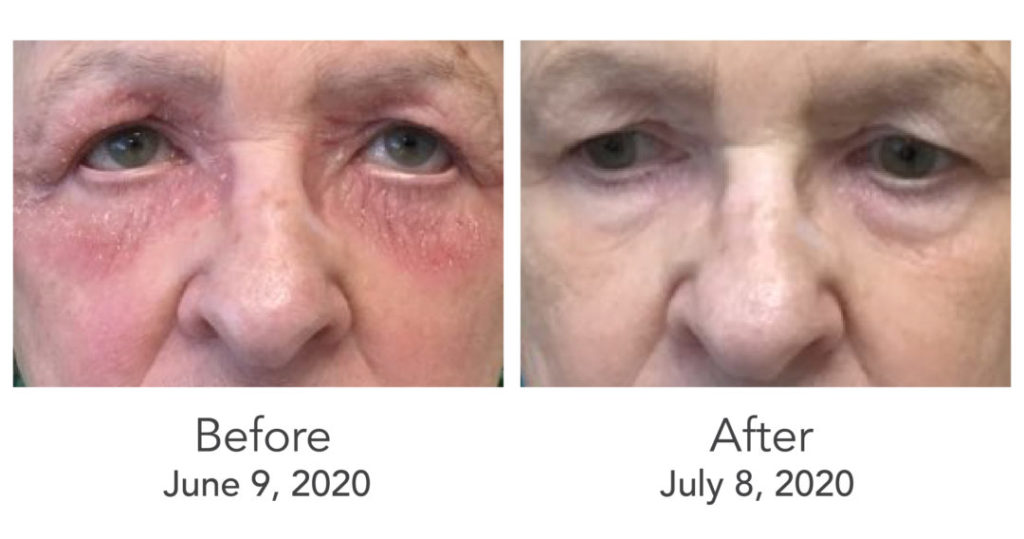
Also known as contact eczema, contact dermatitis is characterized as a red, scaly, and itchy rash. This forms in a mainly localized area where your skin has been exposed to a specific irritant (hence the term “irritant contact dermatitis”). It is frequently more painful than it is itchy.
Dermatitis can also appear as the result of a skin allergy, where your skin has been exposed to a substance that triggers your body into starting an inflammatory reaction against it. Unlike irritant contact dermatitis, this tends to be more itchy than painful. Subsequent exposure to the same allergen can also cause a wider flare-up of your skin. This is known as systemic contact dermatitis.
Many people – even some general physicians – confuse contact dermatitis and skin allergies as they can present with apparently very similar symptoms. Because there are different causes of contact dermatitis and skin allergies, it is useful to seek professional advice from a skin specialist so that the exact cause and type of your dermatitis can be investigated. This way, your treatment plan can be targeted to work most effectively in controlling your symptoms.
Here at Trillium Creek Dermatology, we offer a thorough examination of your condition and appropriate tests to help identify what is causing it. We provide treatment and advise you of simple lifestyle changes that will help you to avoid further flare-ups of your dermatitis in the future. We are serving the following communities and those surrounding: Wooster, Wadsworth, Medina, Brunswick, Strongsville, and Hinkley.
Irritant contact dermatitis
Irritants are substances that are likely to cause physical or biochemical damage to your skin, such as chemicals or friction from clothing. They can also remove the natural oils and moisture from your skin which accelerates that damage so that your skin cannot keep up with its natural repair processes.
Many cases of contact dermatitis occur among people in specific industries where exposure to harsh chemicals can be commonplace. These include hairdressers, domestic staff, and even construction workers.
The areas most likely to be affected are the hands, and you may hear the terms “contact hand” or “contact finger eczema“used to describe this form of dermatitis. However, these are specific diagnoses that can appear from other causes too, for example where there has already been previous damage to the skin. Hand psoriasis is not a form of contact dermatitis and it is treated in a different way. You can read more about psoriasis here.

Irritant contact dermatitis can appear on other parts of the body as well where the skin has become excessively dry. For example, washing with soap and water or detergent can – over a period of weeks – lead to dry areas where the skin can crack and itch. The more commonly affected sites include exposed areas of skin like the face, neck, arms, and scalp, although this drying out of the skin combined with friction from clothing means that contact dermatitis can appear in other areas too such as the trunk, feet, and legs.
Areas where cosmetics, perfumes, and deodorants are applied, such as the eyelids, lips, armpits, and genital area, may be considered as possible causes of irritant contact dermatitis, but your skin specialist will also want to check whether you are reacting to chemicals within these products to rule out any form of skin allergy.
The mechanisms that lead to contact dermatitis in babies are the same as for adults where the skin becomes irritated, damaged, or dry. Even something as simple as a sharp clothing tag or wet diaper can be a contributing factor.
Allergic contact dermatitis / Skin allergies
Allergens work in a slightly different way to irritants. Much like asthma or hay fever where the body reacts to dust or pollen, allergic contact dermatitis comes about because the individual’s immune system is particularly susceptible to that substance in the first place. Common types of allergens include perfumes, cosmetics, dyes, rubber products, and even small traces of nickel found in watch straps, jean studs, and jewelry.
The main areas that are prone to allergic contact dermatitis can closely follow where these allergens come into contact with the skin. Individuals may also reveal an allergy to perfumes in laundry detergents, resulting in allergic contact dermatitis on the body, arms, legs, and feet.
Identifying the allergen that is causing your dermatitis is not always straightforward because there can be a delay between exposure to an allergen and the first signs of a reaction in your skin. A typical natural example is poison ivy which can take up to one week to show up after the first exposure. Ironically, some antiseptic or antibiotic creams that people use to treat skin conditions can also contain substances that cause their skin allergies to flare up. Neosporin being the main one.
Repeated exposure to skin allergens can worsen your dermatitis as your body reacts more aggressively to them. Occasionally, the rash can appear in the form of hives, also known as urticaria. Dermatologists at Trillium Creek Dermatology will be able to help you break this cycle by identifying the factors that you are reacting to. A simple, painless, and non-invasive “patch test” places a variety of mild allergens against your skin to see which ones you react to. Once the nature of your skin allergy has been confirmed, an appropriate regime of prevention and treatment can begin.
Treatment
The treatment of your dermatitis can be quite straightforward once the causal factors have been successfully identified. Our clinic team at Trillium Creek Dermatology will review your medical history and lifestyle and conduct all the appropriate tests. Patch testing is done routinely to identify the source.
Most treatments can be applied directly to the skin. These include moisturizers, antihistamines, and steroid creams. You may also be prescribed a course of tablets depending on the severity of your skin allergy.
Contact Dermatitis and Skin Allergies can easily be treated. Our medically trained skin experts will help to ensure that your treatment plan is uniquely tailored to your specific condition. If you need help with your contact dermatitis, do not hesitate to call at 330.725.0569 to set up an appointment with a qualified Trillium Creek provider today.



